Korean chipmakers
SK Hynix’s HBM chip orders fully booked; 12-layer HBM3E in Q3: CEO
The chipmaker downplayed potential HBM oversupply, saying capacity expansion is in lockstep with demand growth
By May 02, 2024 (Gmt+09:00)
5
Min read
Most Read
LG Chem to sell water filter business to Glenwood PE for $692 million


KT&G eyes overseas M&A after rejecting activist fund's offer


Kyobo Life poised to buy Japan’s SBI Group-owned savings bank


StockX in merger talks with Naver’s online reseller Kream


Meritz backs half of ex-manager’s $210 mn hedge fund


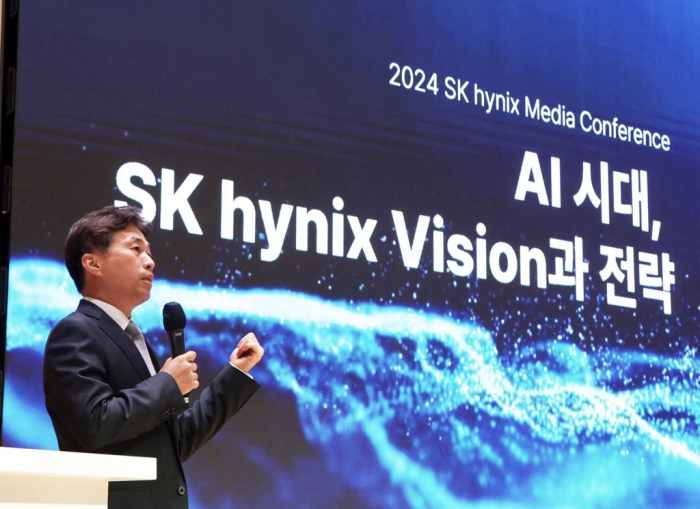
ICHEON, Gyeonggi Province – SK Hynix Inc., the world’s second-largest memory chipmaker after Samsung Electronics Co., said on Thursday its capacity to make high-bandwidth memory (HBM) chips is almost fully booked through next year, underscoring surging demand for semiconductors used in artificial intelligence devices.
“In terms of production, our HBM chips have already sold out for this year and are almost sold out for 2025,” SK Hynix Chief Executive Kwak Noh-jung said during a press conference at the chipmaker’s headquarters in Icheon, southeast of Seoul.
To solidify its HBM market leadership, he said, the company plans to provide samples of its next-generation 12-layer HBM3E chip to clients in May and begin mass production in the third quarter.
Just last week, SK Hynix said it plans to complete the development of next-generation 12-layer HBM3E chips by the end of the third quarter and produce them in large quantities from 2025.
Analysts said the South Korean chipmaker is advancing its HBM chip development roadmap to widen the gap with fast followers, including crosstown rival Samsung.
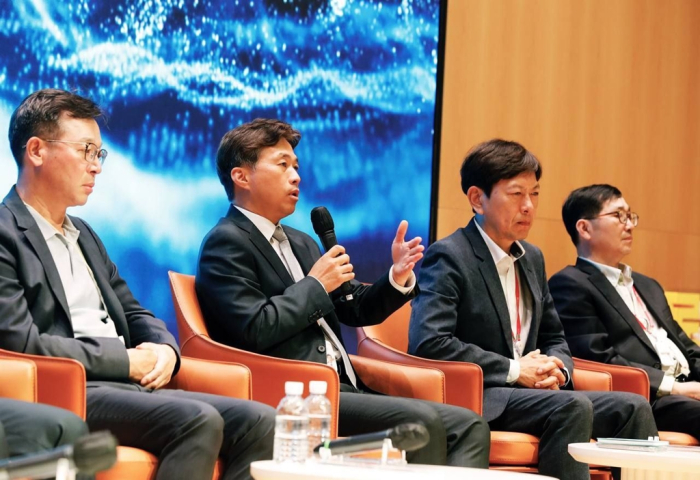
Earlier this week, Kim Jae-june, Samsung’s memory business vice president, said the company had begun mass production of its HBM chips for generative AI chipsets, called 8-layer HBM3E, and sales revenue from the chips will start from the end of the second quarter.
The Samsung executive also said it plans to start making the fifth-generation 12-layer version as early as the second quarter.
The SK Hynix CEO said demand for high-speed, high-capacity and low-power memory chips will “grow exponentially” in the coming years as the use of AI chips is rapidly spreading from data centers to on-device AI systems, including smartphones and autonomous vehicles.
“With the rapid increase in the number of parameters to improve AI performance and the expansion of AI service providers, the HBM market is set to grow at a rate unseen before,” he told reporters.
SK DISMISSES HBM OVERSUPPLY CONCERNS
The CEO said the chip industry’s investment in HBM differs from past practices as its capacity expansion is in lockstep with demand following consultations with customers regarding volume and chip specifications.
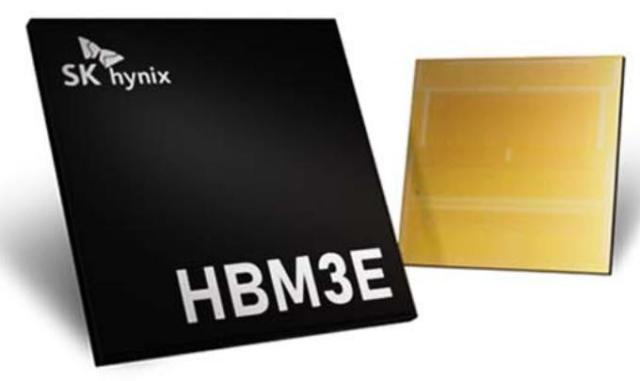
“After HBM4, the manufacturing of HBM chips will be custom-tailored, meaning the risk of an industry oversupply will significantly decrease,” he said.
According to the company, the portion of AI chips, including HBM and high-capacity DRAM modules, is expected to account for 61% of the global memory market in terms of value by 2028 from 5% in 2023.
“We expect to see annual demand growth for HMB at an average of 60% in the mid to long term,” said an SK Hynix executive at the press conference
In response to Samsung’s forecast that its accumulated HBM sales from 2016 to the end of this year could reach some $10 billion, the SK Hynix CEO said: “We cannot give exact figures, but we expect our HBM sales to come in that range or slightly above it.”
MR-MUF TECH UP TO 16-LAYER HBM CHIPS
SK Hynix executives emphasized the importance of MR-MUF, an advanced chip packaging technology for HBM chips.
“There is an industry view that MR-MUF technology may have limitations in high-level stacking, but that is not the case,” said Choi Woo-jin, vice president and head of Packaging & Test (P&T) at SK Hynix.
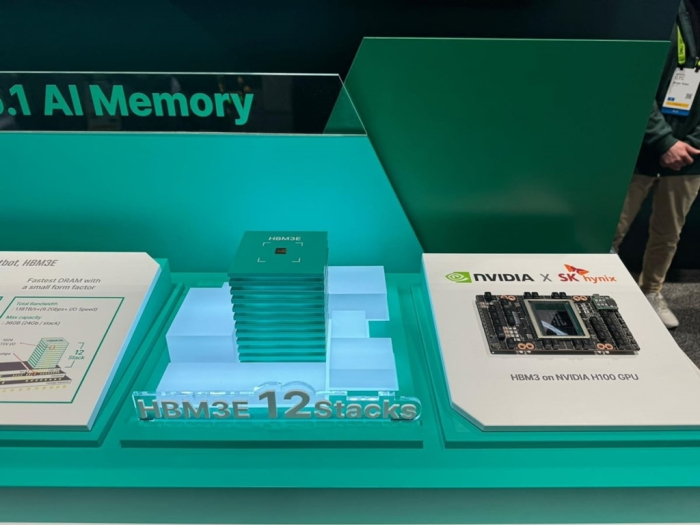
“We are already mass-producing 12-layer HBM3 products with advanced MR-MUF technology. We expect the technology to be the most suitable to control chip bending and an excellent solution for stacking with a high-temperature, low-pressure method,” he said.
MU-MUF technology reduces chip stacking pressure by 6% compared to previous processes and cuts the processing time, resulting in a fourfold rise in productivity and 45% improvement in heat dissipation, according to SK Hynix.
“We’re on the right track to developing 16-layer HBM chips with our MR-MUF technology. We’re also proactively considering using hybrid bonding technology,” Choi said.
LEADING THE PACK
CEO Kwak said SK Hynix, which joined the SK Group in 2012, has been investing heavily in advancing its DRAM technology even when its rivals were drastically cutting such investment.
Although Samsung is the world’s top memory chipmaker, it lags behind crosstown rival SK Hynix, which has been leading the pack in the HBM DRAM segment for years.
Last week, SK Hynix said it swung to a profit in the first quarter with record quarterly sales, emerging as the latest chipmaker to confirm solid recovery in the memory semiconductor market.
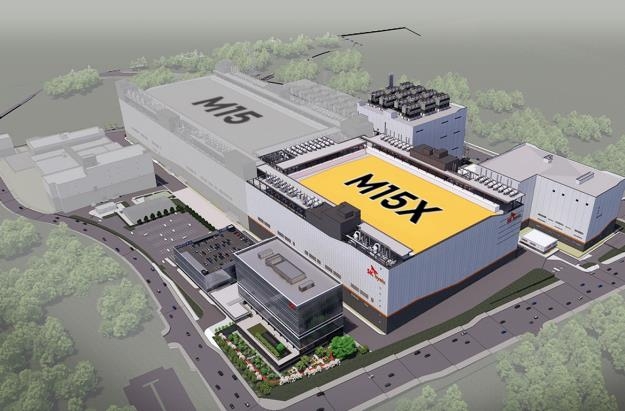
The company attributed its stronger-than-expected results to robust sales of its premium products for AI, including HBM chips and a rebound in NAND flash memory chips.
Among memory chipmakers, SK Hynix is the biggest beneficiary of the explosive increase in AI adoption, as it dominates the production of HBM, critical for generative AI computing and is the top supplier of AI chips to Nvidia Corp., which controls 80% of the AI chip market.
To hold its lead, SK Hynix earlier last month announced a $3.87 billion investment to build an advanced chip packaging plant in the US state of Indiana with an HBM chip line and research and development for AI products.
It also announced a collaboration with Taiwan Semiconductor Manufacturing Co. (TSMC), the world’s top contract chipmaker, to develop next-generation AI chips, called HBM4.
In late April, the company said it would spend 20 trillion won to build a new HBM DRAM plant at a site originally designated for a NAND facility in Korea to ride the AI wave.
Write to Eui-Myung Park at uimyung@hankyung.com
In-Soo Nam edited this article.
More to Read
-
 EarningsSK Hynix, latest chipmaker to emerge victorious with record Q1 sales
EarningsSK Hynix, latest chipmaker to emerge victorious with record Q1 salesApr 25, 2024 (Gmt+09:00)
3 Min read -
 Korean chipmakersSamsung shifts gears to focus on HBM, server memory chips
Korean chipmakersSamsung shifts gears to focus on HBM, server memory chipsApr 30, 2024 (Gmt+09:00)
3 Min read -
 Korean chipmakersSK Hynix to invest $14.6 bn to build HBM plant in S.Korea
Korean chipmakersSK Hynix to invest $14.6 bn to build HBM plant in S.KoreaApr 24, 2024 (Gmt+09:00)
4 Min read -
 Korean chipmakersSK Hynix, TSMC tie up to stay ahead of Samsung for HBM supremacy
Korean chipmakersSK Hynix, TSMC tie up to stay ahead of Samsung for HBM supremacyApr 19, 2024 (Gmt+09:00)
4 Min read -
 Korean chipmakersSamsung to unveil Mach-1 AI chip to upend SK Hynix’s HBM leadership
Korean chipmakersSamsung to unveil Mach-1 AI chip to upend SK Hynix’s HBM leadershipMar 20, 2024 (Gmt+09:00)
3 Min read -
 Korean chipmakersSamsung set to triple HBM output in 2024 to lead AI chip era
Korean chipmakersSamsung set to triple HBM output in 2024 to lead AI chip eraMar 27, 2024 (Gmt+09:00)
3 Min read
Comment 0
LOG IN


